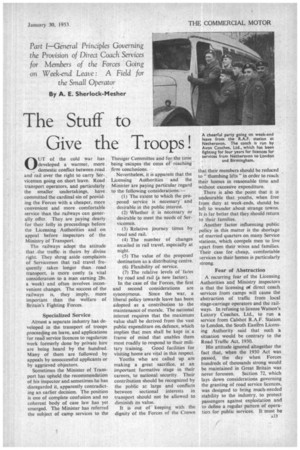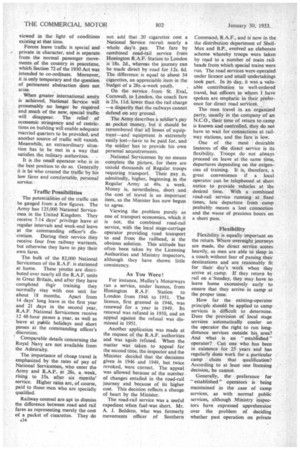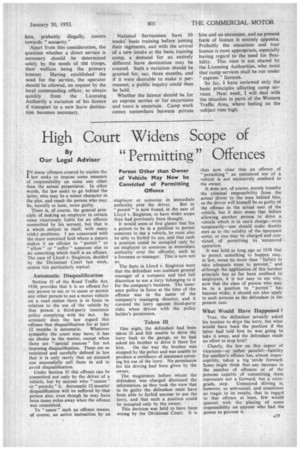The Stuff to ive the Troops!
Page 119

Page 120

Page 123

If you've noticed an error in this article please click here to report it so we can fix it.
OUT of the cold war has , developed a warmer, more domestic conflict between road . _ and rail over the right to carry Ser, vicemen going on short leave. Road transport operators, and particularly the smaller undertakings, have committed the cardinal sin of providing the Forces with a cheaper, more convenient and more comfortable service than the railways can generally offer. They are paying dearly for their folly in proceedings before the Licensing Authorities and on appeal before inspectors of the Ministry of Transport.
The railways adopt the attitude that .the traffic is theirs by divine right. They shrug aside complaints of Servicemen that rail travel frequently takes longer than road transport, is more costly (a vital consideration to a man earning 28s. a week) and often involves inconvenient changes. The success of the railways is, they imply, more important than the welfare of Britain's Fighting Forces.
Specialized Service
Almost a separate industry has developed in the transport of troops proceeding on leave, and applications for road service licences to regularize work formerly done by private hire are being heard by the hundred. Many of them are followed by appeals by unsuccessful applicants or by aggrieved objectors.
Sometimes the Minister of Transport has upheld the recommendation of his inspector and sometimes he has disregarded it, apparently contradicting an earlier decision. The position is one of complete confusion and no coherent body of case law has yet emerged. The Minister has referred the subject of camp services to the Thesiger Committee and for the time being escapes the onus of reaching firm conclusions.
Nevertheless, it is apparent that the Licensing Authorities and the Minister are paying particular regard to the following considerations:—
(1) The extent to which the proposed service is necessary and desirable in the public interest. • (2) Whether it is necessary or desirable to meet the needs of Servicemen.
(3) Relative journey times by road and rail.
14) The number of changes entailed in rail travel, especially at night.
(5) The value of the proposed destination as a distributing centre.
(6) Flexibility of service.
(7) The relative levels of 'fares by road and rail (a new factor).
In the case of the Forces, the first and second considerations are synonymous. Since the war, a liberal policy towards leave has been adopted as a contribution to the maintenance of morale. The national interest requires that the maximum value shall be derived from the vast public expenditure on, defence, which implies that men shall be kept in' a frame of mind that enables them most readily to respond to their military training. Good facilities for visiting home are vital in this respect.
Youths who are called up are making a great sacrifice, at an important formative stage in their careers, to national security. Their contribution should be recognized by the public at large and conflicts between sectional interests in transport should not be allowed to diminish its value.
It is out of keeping with the dignity of the Forces of the Crown that their members should be reduced to" thumbing lifts " in order to reach their homes in reasonable time and without excessive expenditure.
There is also the point that it is undesirable that youths, when free from duty at week-ends, should be left to wander about strange towns. It is far better that they should return to their families.
Another factor influencing public policy in this matter is the shortage of married quarters on many Service stations, which compels men to live apart from their wives and families. Their case for cheap, comfortable services to their homes is particularly strong.
Fear of Abstraction A recurring fear of the Licensing Authorities and Ministry inspectors is that the licensing of direct coach services from camps will cause the abstraction of traffic from local stage-carriage operators and the railways. In refusing to license Watson's Luxury Coaches, Ltd., to run a service from Calshot R.A.F. Station to London, the South EastSm Licensing Authority said that such a situation would be contrary to the Road Traffic Act, 1930.
His attitude ignored altogether the fact that, when the 1930 Act was passed, the day when Forces hundreds of thousands strong would be maintained in Great Britain was never foreseen. Section 72, which lays down considerations governing the granting of road service licences, was designed to bring much-needed stability to the industry, to protect passengers against exploitation and to define a regular pattern of operation for public services. It must be viewed in the light of conditions existing at that time.
Forces leave traffic is special and private in character, and is separate from the normal passenger movements of the country in peacetime, which Section 72 of the 1930 Act was intended to co-ordinate. Moreover, it is only temporary and the question of permanent abstraction does not arise.
When greater international amity is achieved, National Service will presumably no longer be required and much of the new, special traffic will disappear. The relief of economic stringency and of restrictions on building will enable adequate married quarters to be provided, and another source of traffic will vanish. Meanwhile, an extraordinary situation has to be met in a way that satisfies thc. military authorities.
It is the small operatorwho is in the best position to do so. Generally it is he who created the traffic by his low fares and comfortable, personal service.
Traffic Possibilities The potentialities of the traffic can be gauged from a few figures. The Army has 125,000 National Servicemen in the United Kingdom. They receive 7-14 days' privilege leave at regular intervals and week-end leave at the commanding officer's dis cretion. During their service they receive four free railway warrants, but otherwise they have to pay their own fares.
The bulk of the 82,000 National Servicemen of the R.A.F. is stationed at home. 'These youths are distributed over nearly all the R.A.F. units in Great Britain, and after they have completed thgir training they normally stay with one unit for about 18 months. Apart from 14 days' long leave in the first year and 21 days in the second year, R.A.F. National Servicemen receive 12 48-hour passes a year, as well as leave at public holidays and short passes at the commanding officer's discretion.
Comparable details concerning the Royal Navy are not available from the Admiralty.
The importance of cheap travel is emphasized by the rates of pay of National Servicemen, who enter the Army and R.A.F. at 28s. a week, rising to 35s. after six months' service. Higher rates are, of course, paid to those men who are specially qualifiecL Railway counsel are apt to dismiss the difference between road and rail fares as representing merely the cost of a packet of cigarettes. They do 534 not add that 20 cigarettes cost a National Service recruit nearly a whole day's pay. The fare by combined road-rail service from Honington R.A.F. Station to London is 18s. 2d., whereas the journey can be made direct by road for 12s. 6d. The difference is equal to about 34 cigarettes, an appreciable item in the budget of a 28s.-a-week youth.
On the service from St. Eval, Cornwall, to London, the coach fare is 23s. 11d, lower than the rail charge —a disparity that the railways cannot defend on any ground., The Army describes a soldier's pay as pocket money, but it should be remembered that all losses of equipment—and equipment is extremely easily lost—have to be paid for, and the seldier has to provide his own personal accoutrements.
National Servicemen by no means complete the picture, for there are untold thousands of Regular troops requiring transport. Their pay is, admittedly, higher, beginning in the Regular Army at 49s. a week. Money is, nevertheless, short and the cost of travel is an important item, as the Minister has now begun to agree.
Viewing the problem purely as one of transport economics, which it is not, the combined road-rail service, with the local stage-carriage operator providing road transport to and from the railhead, is the obvious solution. This attitude has often been taken by the Licensing Authorities and Ministry inspectors, although they have shown little consistency.
As You Were For instance, Mulley's Motorways ran a service, under licence, from Honington R.A.F. Station to London from 1946 to 1951. The licence, first granted in 1946, was renewed for a year in 1949. Its renewal was refused in 1950, and an appeal against the refusal was dismissed in 1951.
Another application was made at the request of the R.A.F. authorities and was again refused. When the matter was taken to appeal for the second time, the inspector and the Minister decided that the decisions given in 1946 and 1949, but twice revoked, were correct. The appeal was allowed because of the number of changes entailed in the road-rail journey and because of its higher cost. This decision reflects a change of heart by the Minister.
The road-rail service was a useful expedient when fuel was short. Mr. A. J. Boldero, who was formerly movements officer of Southern Command, R.A.F., and is now in the the distribution department of ShellMex and B.P., evolved an elaborate scheme whereby troops were taken by road to a number of main railheads from which special trains were run. The road services were operated under licence and small undertakings took part. In its day, it was a valuable contribution to well-ordered travel, but officers to whom I have spoken are emphatic in their preference for direct road services_ The men travel in an organized party, usually in the company of an N.C.O., their time of return to camp is known and controlled, they do not have to wait for connections at railway stations, and the fare is low.
One of the most desirable features of the direct service is its flexibility. Troops do not always• proceed on leave at the same time, departures depending on the exigencies of training. It is, therefore, a great convenience if a local operator can be telephoned at short notice to provide vehicles at the desired time. With a combined road-rail service running at fixed times, late departure from camp probably means a lost connection and the waste of precious hours on a short pass.
Flexibility Flexibility is equally-important on the return. Where overnight journeys are made, the direct service scores heavily, as men are able to sleep in a coach without fear of passing their destinations and are reasonably fit for their day's work when they arrive at camp. If they return by rail on a Sunday, they may have to leave home excessively early to ensure that they arrive in camp at the proper time.
How far the existing-operator principle should be applied to camp services is difficult to determine. Does the provision of local stage services automatically confer on the operator the right to run longdistance services outside his area? And what is an " established " operator? Can one who has been in existence for 25 years and has regularly done work for a particular camp claim that qualification? According to at least one licensing decision, he cannot.
Generally, the preference for " established " operators is being maintained in the case of camp services, as with normal public services, although Ministry inspectors have expressed apprehension over the problem of deciding whether past operation on private
hire, probably illegally, counts towards "seniority."
Apart from this consideration, the question whether a direct service is necessary should be determined solely by the needs of the troops, their welfare being the primary interest. Having established the need for the service, the operator should be allowed, on request by the local commanding officer, to obtain • quickly from the Licensing Authority a variation of his licence if transport to a new leave destination becomes necessary. National Servicemen have 10 weeks' basic training before joining their regiments, and with the arrival of a new intake at the basic training camp, a demand for an entirely different leave destination may be created. Such a variation should be granted for, say, three months, and if it were desirable to make it permanent, a public inquiry could then be held.
Whether the licence should be for an express service or for excursions and tours is uncertain. Camp work comes somewhere between private hire and an excursion, and no present form of licence is entirely apposite. Probably the excursion and tour licence is most appropriate, especially having regard to the need for flexibility. This view 'is not shared by the Licensing Authorities, who insist that camp services shall be run under " express " licences. *
So far, I have reviewed only the basic principles affecting camp services. Next week, I will deal with the situation in parts of the Western Traffic Area, where feeling on the subject runs high.
























































































































































